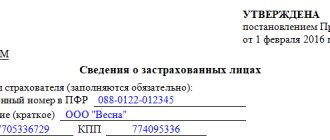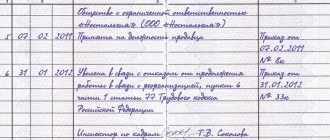An NPO (non-profit organization) is an organization that does not pursue the goal of extracting maximum profit from its activities. The main goals of NPOs are the implementation of charitable, sociocultural and educational goals. Such organizations perform important social functions and are necessary for society, its development and progress. At the same time, there are several types of such companies that must be taken into account when registering an NPO. We will talk about this further.
Main types and forms of NPOs
In accordance with the Law of the Russian Federation “On Non-Profit Organizations”, NPOs operate in the established forms:
- Public and religious organizations. They are created by voluntary agreement of citizens to satisfy spiritual and other non-material needs. Such associations can be created in one of the following organizational and legal forms: public organization; social movement; public fund; public institution; public initiative body.
- Communities of small indigenous peoples of the Russian Federation. Such peoples unite on the basis of kinship, territorial proximity to preserve culture and traditionally accepted way of life.
- Cossack societies. Communities of citizens to recreate the traditions of the Russian Cossacks. Their participants undertake obligations to perform public or other service. Such NPOs are formed by farm, stanitsa, city, district and military Cossack societies.
- Funds. They are formed through voluntary contributions from citizens or legal entities for the purpose of charity, support of cultural and educational events, etc. Property transferred to the foundation by its founders is considered the property of the foundation. The founders are not liable for the fund's obligations. The Foundation has the right to create business companies or participate in them.
- State corporations. Established by the Russian Federation at the expense of a material contribution. They are formed to implement socially important functions, including managerial and social ones.
- State companies. The Russian Federation is created on the basis of property contributions for the purpose of providing public services and other functions using state property.
- Non-profit partnerships. They are created by individuals and legal entities to create various public goods.
- Private institutions. They are created by the owner for the purpose of implementing functions of a non-commercial nature, including managerial, socio-cultural.
- State and municipal institutions. Created by the Russian Federation, constituent entities of the Russian Federation and municipalities. They can be autonomous, budgetary and government-owned. The main goals include the implementation of powers in socio-cultural areas.
- Autonomous non-profit organizations. They are formed with the aim of providing socially necessary services in various social spheres.
- Associations (unions). They are created to protect the joint, often professional, interests of their members.
Where does the creation of an NPO begin?
The creation of a non-profit organization begins with determining the form of activity. In total, there are 6 forms of NPOs (Chapter II of Federal Law-7 of January 12, 1996):
- public organizations and religious communities;
- funds;
- non-profit partnerships;
- private institutions;
- autonomous organizations;
- associations or unions.
Regardless of their form, NPOs are voluntary associations that are created by ordinary citizens or legal entities. The creators of non-profit organizations are united by common interests and goals. As a rule, they work for the benefit of society and pursue socially significant goals. For example, charity or development of health, sports, education.
NPOs are created using voluntary donations or contributions from its members. Moreover, in the future, the contributed property is recognized as the property of the organization, which is not liable for the debts of its participants. Likewise, members of a non-profit organization are not liable for its obligations.
Who cannot be a founder and participant of an NPO?
The following categories of legal entities or individuals are prohibited from becoming founders or participants or members of NPOs:
- Foreign citizens or stateless persons in respect of whom a decision has been made that their presence on the territory of the Russian Federation is undesirable.
- Individuals and legal entities that do not comply with the requirements of federal laws defining the position, procedure for the creation, activities, organization and liquidation of non-profit organizations.
- Persons included in the list in accordance with paragraph 2 of Article 6 of the Federal Law “On Combating the Legalization (Laundering) of Funds Obtained from Crime.”
- Public and religious organizations whose activities have been suspended in accordance with Article 10 of the Federal Law “On Combating Extremist Activities.”
- Individuals who have been convicted in court for extremist activities.
Documents required for registration
The papers must be submitted to the Ministry of Justice within 3 months from the date of the decision to create an NPO. The list of documents is given in the table (clause 5 of Article 13.1 of the Law).
| Title of the document | Number of copies/copies |
| Statement | 2 |
| Founding papers | 3 |
| The decision to create | 2 |
| Participant information | 2 |
| Duty receipt | 2 (original/copy) |
| Address details | 1 |
If the name of the association contains the name of a person, symbols related to the intellectual property of the Russian Federation, or the name of another organization, then you need to submit documents for the right to use the name. The Ministry of Justice does not have the right to require other documents when registering an association.
Registration of an NPO: step-by-step instructions
At the moment, the Ministry of Justice of the Russian Federation is dealing with the registration of non-profit organizations. The Ministry of Justice and its territorial branches make decisions on the state registration of NPOs, including issues of its creation, reorganization or liquidation. Let us consider in detail the process of registering non-profit organizations.
Determining the direction and goals of work
The types of economic activities are selected in accordance with the laws of the Russian Federation and the purposes for which the association is created. Unlike commercial ones, NPOs have the right to engage in not all types of activities listed in OKVED.
Determination of legal address
According to civil law, an association must be registered at the location of its executive body. The work of NPOs is controlled by the Ministry of Justice. He can check the legal address. If violations are detected, the organization may be subject to sanctions in the form of fines, restrictions, or going to court for forced liquidation.
Preparation of statutory documentation
The statutory documents of a non-profit organization must contain the following information:
- full name of the NPO;
- nature of the activity and general public fund (you must indicate all types of activities that the organization intends to engage in);
- legal address of the organization;
- goal and tasks;
- features of management policy;
- rights and obligations of founders and members;
- information about representative offices and branches (if any);
- rules for admission and exit from the association;
- features of changes in constituent documentation;
- regulation of NPO ownership issues.
In addition, additional requirements of Law No. 7-FZ and the Civil Code of the Russian Federation must be taken into account. So, in accordance with paragraph 2 of Art. 123.9 of the Civil Code of the Russian Federation, the charter of an association (union) must contain information about the property rights and obligations of its members.
The constituent agreement defines the obligations of the founders in terms of actions to create an NPO and the formation of its property, etc. The Ministry of Justice of the Russian Federation conducts a legal examination of the submitted constituent documents for compliance with the legislation of the Russian Federation.
Preparing an application
The application must be drawn up in form RN0001. The form must correctly indicate:
- personal data of the applicant;
- his contact details;
- location.
To submit this application, it must be notarized.
Payment of the state fee for registration of an NPO
According to tax legislation, a fee is paid when registering an NPO. The legislation provides for the following procedure and amount of collection of state duty:
State fees for registration of non-profit organizations
- Non-profit organizations - 4000 rubles
- Political parties and regional branches of political parties - 3500 rubles
- All-Russian public organizations of disabled people - 1400 rubles
- Entering data into the state register of self-regulatory organizations - 6,500 rubles
List of required documents
For subsequent submission to the registration authority, you need to prepare the following set of necessary papers:
- constituent documentation – Charter, constituent agreement in 3 copies
- decision to create an NPO - minutes of the meeting of founders or a sole decision (if there is only one founder), 2 copies will be required
- passport details of the founders – 2 pcs.
- information about the territorial affiliation of the organization, confirmed by a lease agreement, letter of guarantee, certificate of ownership of real estate, etc.
- receipt confirming payment of state duty (original and copy)
- certified application for state registration of an NPO (according to form RN0001) – 2 copies, both with a handwritten signature of the same person whose data appears on the state duty receipt.
Submitting documents and next steps
The next steps look like this:
- Submission of documents to the Ministry of Justice. A complete list of required papers is given in the Law. If the decision to register is positive, the newly created NPO is entered into the Unified State Register of Legal Entities by the Federal Tax Service. This will take approximately 7 working days. After entering the necessary information, the Federal Tax Service forwards information about the completion of registration to the relevant territorial body of the Ministry of Justice.
- Obtaining a certificate.
- Receiving statistics codes. The founder or his representative can contact Rosstat using a notarized power of attorney. You need to submit a certificate, an extract from the Unified State Register of Legal Entities and write a corresponding application.
- Accounting in funds. NPOs are required to register with pension, medical and social insurance funds.
- Making a seal.
- Opening an account. The association selects a bank and opens a current account in it. It will be required for non-cash payments.
Timeframe for making a decision
According to practice, the time frame for registering an NPO with the Ministry of Justice is no more than 30 working days .
If all the documents are in order and there are no reasons for refusing to register the NPO, the Ministry of Justice or its territorial branch makes the final decision no later than 14 working days from the date of receipt of the package of documents.
After this, the information and documents are sent to the Federal Tax Service (FTS) for inclusion in the Unified State Register of Legal Entities (USRLE).
Based on the data received, information about the new NPO is entered into the register within 5 working days, and no later than the next working day, the Federal Tax Service informs the Ministry of Justice about this, which in turn, no later than three working days, issues the applicant a certificate of state registration of his non-profit organization.
Nuances of the functioning of NPOs
NPOs differ from commercial structures not only in their “non-monetary” focus, but also in their subordination - their registration is in charge of the Ministry of Justice, and not the tax inspectorates. And it is much more demanding and severe in relation to the consideration of applications and registration.
- A non-profit organization is considered created as soon as it has passed the state registration procedure. From this moment on, it has the right to function indefinitely, unless otherwise provided by its constituent documentation.
- Legal entities-NPOs can engage in one or several types of regulated activities, which must be reflected in the Charter.
- Although this type of legal entity does not relate to commerce, good deeds also require finance, so NPOs must have their own capital and prepare an estimate.
- Some types of NPO activities require a license.
- This kind of organization, unfortunately, can be subject to pressure, against the possibility of which the state has developed a number of precautions. These measures are aimed, first of all, at the transparency of cash flows of NPOs, since unscrupulous investors can also take advantage of them.
NOTE! If a foreign structure decides to create such an organization, the state must check it for a possible threat to national security and the Constitution of the Russian Federation: this is stated in the “Law on Foreign Agents” dated June 18, 2020 No. 121-FZ and the “Law on the Register of Undesirable Organizations” dated May 23, 2015 year No. 129-FZ.
Refusal to register an NPO
Reasons for refusal
The most common reasons why registration of an NPO may be denied:
- the constituent and other documents of a non-profit organization submitted for state registration contradict the Constitution of the Russian Federation and the legislation of the Russian Federation
- a non-profit organization with the same name was previously registered
- the name of a non-profit organization offends the morality, national and religious feelings of citizens
- the documents required for state registration, provided for by this federal law, have not been submitted in full or have been submitted to the wrong authority
- if a person acting as a founder of a non-profit organization cannot be a founder in accordance with federal law
- the documents submitted for state registration contain inaccurate information.
The decision to refuse is made in writing with an explanation of the reasons and is transmitted to the applicant within 3 days.
What to do in case of refusal
If registration of a non-profit organization is refused, the founder of the NPO has a choice: agree with the decision made or seek to change it.
Refusal to state registration of a non-profit organization does not prohibit resubmitting documents for state registration, provided that the grounds that caused the refusal have been eliminated. Repeated submission of an application for state registration of a non-profit organization and a decision on this application are carried out in the manner prescribed by the Federal Law “On Non-Profit Organizations”.
What is an NPO
NPO stands for “non-profit organization”. This means that its primary task is not material earnings and its distribution among the founders, although the law does not prohibit engaging in business to achieve planned goals. What distinguishes NPOs from commercial structures is their main goal - the achievement of one or another public good.
The tasks of an NPO may include the following questions:
- social nature;
- charity;
- cultural sphere;
- environmental protection;
- public health;
- training and scientific activities;
- sports industry;
- spiritual needs of people;
- protecting the interests and rights of different categories of the population, including legal ones;
- mediation in conflicts.
FOR YOUR INFORMATION! The state regulates the activities of NPOs in Federal Law No. 7-FZ of January 12, 1996 “On Non-Profit Organizations”.
Defining features of an NPO:
- profit is not the purpose of the legal entity’s activities;
- funds are not distributed among the founders;
- The scope of activity formulated in the Charter relates to the field of social protection, culture, sports science and other public goods.
Features of registration of an autonomous non-profit organization (autonomous non-profit organization)
When preparing for registration of an independent non-profit organization, the following features must be taken into account:
- There are no restrictions on the number of founders either in Law No. 7-FZ or in the Civil Code of the Russian Federation. Accordingly, the minimum is 1 founder (clause 1 of Article 123.24 of the Civil Code of the Russian Federation). Information about it is entered into the Unified State Register of Legal Entities. If the founder is the only one, he decides to establish an autonomous non-profit organization; if there is a larger number, a meeting is held and its minutes are prepared.
- This OPF is unitary and does not provide for membership, however, the founders retain their status throughout the existence of the ANO and manage it (clause 1 of Article 123.25 of the Civil Code of the Russian Federation). The composition of the founders can be changed at any stage of the existence of an autonomous non-profit organization (clauses 1, 6, article 123.24 of the Civil Code of the Russian Federation).
- The founding document of the ANO is the charter. It should list the name of the autonomous non-profit organization, areas of work, the order of formation and competence of the bodies, etc. (clause 2 of article 123.24 of the Civil Code of the Russian Federation).
- The highest governing body of the ANO is the meeting of founders. The formation of a sole executive body is mandatory. In addition, a collegial executive body may be formed (Article 123.25 of the Civil Code of the Russian Federation).
What to name an NPO
The law obliges NPOs to be named using two components:
- proper name;
- indications of his OPF.
For example: the consumer society "Gidrostroitel", the charitable foundation "Saving Hearts", the religious organization "Seventh-day Adventists", etc. Incorrect wording can do a disservice during registration.
If in the process of operation it is decided to rename the NPO or change its OPF, it will be necessary to register these changes by state procedure. This is a rather labor-intensive process that involves making changes to all constituent documents, destroying the seal and making a new one, notifying all counterparties, the bank, statistical authorities, and social funds.
BE CAREFUL! When formulating the name of an NPO, check whether an organization with that name is already registered - this will also be grounds for refusal of registration.
Since the name of an NPO must clearly indicate the type of activity, overlaps with the names of commercial organizations are excluded.
After registration, the NPO will have the exclusive right to use the name.
Features of re-registration of a non-profit organization
This procedure is necessary in order to legalize the changes made by registering them with the tax office. After this they are recognized as valid. NPOs must be re-registered when changing the term of office of management, name, address, organizational and legal form, changes in constituent papers, or opening branches. The procedure consists of making appropriate changes to the Unified State Register of Legal Entities. To complete this, you need to pay a state fee of 20% of the original fee. The procedure and timing for making changes are the same as for the initial registration of the association.
Registration of changes that do not affect the Charter and constituent papers is not subject to state duty. For example, re-election of a leader, changes in the composition of participants or their passport details.
Registration steps required to open an NPO
One of the key stages in creating an NPO is preparing a registration form and submitting a set of documentation to the Ministry of Justice. The application form, which is submitted for registration upon creation, was approved by order of the Federal Tax Service of Russia dated January 25, 2012 No. ММВ-7-6/ [email protected] (form No. Р11001). The procedure for filling out the application document is determined by the same order (Appendix No. 20).
The application is filled out in accordance with the following requirements:
- It is necessary to reflect the full name of the legal entity, including an indication of the organizational and legal form.
- Information about the participants of the organization must be indicated separately for each founder.
- As an applicant, the application must indicate the person who will actually be involved in registering the NPO:
- founder;
- manager;
- authorized representative (based on a executed power of attorney).
The applicant's signature on the form must be notarized.
- The application form is filled out in two original copies, of which only one is certified by a notary.
When submitting an application for registration, the following must be attached to it:
- constituent documentation;
- decision to form an organization;
- power of attorney for the applicant;
- information about the founders;
- information about the address of the NPO;
- receipt for payment of state duty.
If registration is successful, then after receiving registration documents for the full functioning of the company you should:
- Obtain statistics codes by contacting Rosstat.
- Register with the Pension Fund and the Social Insurance Fund.
- Make a seal.
- Open a bank account and inform the Federal Tax Service about it.
Procedure
Registration of a non-profit organization (NPO) takes place in several stages:
- The applicant submits documents for registration to the territorial body of the Ministry of Justice of Russia or the Central Office of the Ministry of Justice of Russia - depending on the specifics and scale of the future organization.
- The authorized body makes a decision on registration of an NPO and forwards the documents to the registration authority (FTS).
- The Federal Tax Service carries out registration and makes a corresponding entry in the Unified State Register of Legal Entities (USRLE).
- Documents on registration of NPOs are received by the territorial body of the Ministry of Justice of Russia or the Central Office of the Ministry of Justice of Russia. The authorized body enters information into the departmental register.
- The applicant receives a certificate of registration of the NPO, a certificate of entry into the Unified State Register of Legal Entities, an extract from the Unified State Register of Legal Entities and a charter with a mark from the registering authority.
Documents are submitted to the Central Office of the Ministry of Justice of Russia upon registration:
- all-Russian and international public associations;
- political parties;
- branches of international organizations and foreign non-governmental NGOs;
- centralized religious organizations, if their local branches are located in 2 or more constituent entities of the Russian Federation.
Documents are submitted to the territorial branch of the Ministry of Justice of Russia upon registration:
- local and regional public associations;
- branches and divisions of political parties;
- religious organizations at the local level;
- centralized religious organizations, if their local branches are located within one subject of the Russian Federation;
- other NPOs.











